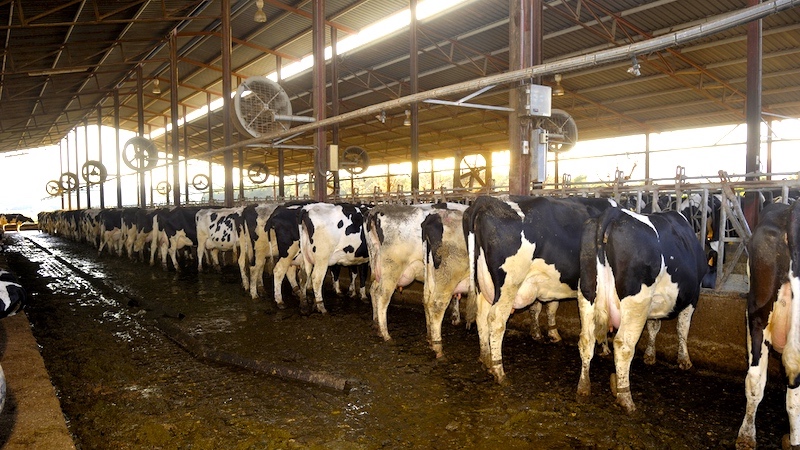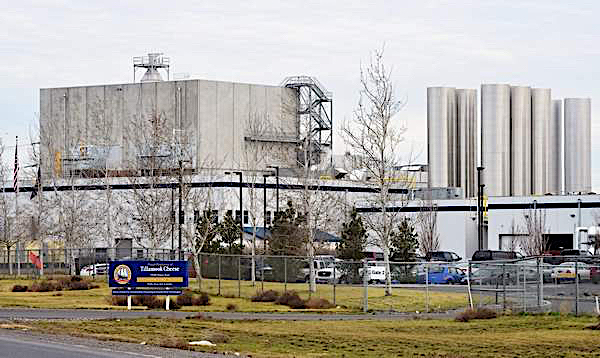
Dairy Done Right? Don't Buy Greenwashing of Tillamook's Products
When the recent e-mail from New Seasons Market arrived in my in-box touting its efforts at "digging down to the ground for Earth Day," I looked down the page to see what great companies they might be celebrating. Then I saw under the headline "Dairy Done Right" a photo of a pristine river with this copy:
"We’re on board for a dairy-licious sustainability initiative with Tillamook County Creamery Association and Zero Footprint to create a riparian forest on regional dairy farms within TCCA’s co-op. By replanting unvegetated ground with native species, the project will sequester carbon, protect and improve water quality, and enhance wildlife habitat."
That's when my head exploded. Why?
While I applaud companies' genuine efforts to reduce their carbon footprint and repair damage to natural systems, this kind of token effort on a few farms in the diminishing membership of the TCCA co-op is the definition of "greenwashing," or "misleading or deceptive publicity disseminated by an organization so as to present an environmentally responsible public image."
The vast majority of the milk used in Tillamook's products
comes not from cows on farms on Oregon's coast, but from a 70,000-cow
industrial factory farm dairy in Boardman, Oregon.
That's because the vast majority of the milk used in Tillamook's products—Tillamook is the commonly referred to name of the TCCA—comes not from cows on farms on Oregon's coast, but from a 70,000-cow industrial factory farm dairy in Boardman, Oregon, among those contributing to a crisis caused by pollution from industrial farms.
“If Tillamook and New Seasons want to sell real dairy ‘done right’ they need to stop sourcing from confinement mega-dairies like Threemile Canyon [Farms], which threaten our climate, clean air and water, and community health," according to Amy Van Saun, Senior Attorney for the Center For Food Safety. "They especially must commit to not contracting with the pending Easterday mega-dairy, which is proposed to reopen the disastrous Lost Valley mega-dairy near Hermiston, where residents are already suffering with a drinking water emergency caused in large part by mega-dairies in the area.”
Recent testing of drinking water from wells that draw from that area's aquifer shows the situation has grown dire. Even households that were fitted with reverse-osmosis filters designed to filter out nitrates were shown to have levels of the pollutant "between 29 parts per million to nearly 48 parts per million—up to nearly five times the federal safe limit" according to an article in the Oregon Capital Chronicle.
In the same article, it quotes the technician who called with the test results from the six samples tested as asking, "No one is drinking this, right?"
Because of the extreme levels of nitrate pollution in the groundwater, mostly from agricultural sources, Morrow County has declared an emergency and the federal Environmental Protection Agency (EPA) is considering using its emergency authority to intervene in the region.
When you think Tillamook, think factory farms.
Tarah Heinzen, Legal Director of Food and Water Watch has advice for shoppers: “When you think Tillamook, think factory farms. Behind the company’s sustainability claims and idyllic images of family farms is a harsh reality: most of Tillamook’s milk comes from the state’s largest mega-dairy, raising tens of thousands of cows in confinement.
"This factory farm is a dirty operation, regularly violating state air quality laws and contributing heavily to the climate crisis," Heinzen adds. "Oregonians know better and are demanding better, backing multiple bills in Salem to rein in destructive factory farms [see NOTE below]. Oregonians have the right to know the truth behind their food. And the truth is, there is nothing green about Tillamook.”
In addition, the TCCA is the subject of a class action lawsuit on behalf of consumers who are alleging that Tillamook violated Oregon's strict Unfair Trade Practices Act, claiming that most of the cooperative’s milk is produced by cows confined in an “industrialized dairy factory” in Morrow County, rather than living on small family farms with access to pastures in Tillamook County as the company advertised.
Dairy done right? I think not.
Read the article I wrote for Civil Eats about the damage mega-dairies do to communities.
NOTE: Two bills addressing factory farms have advanced out of the Senate Natural Resources committee of the Oregon Legislature and are headed for the Rules Committee before going to the floor for a vote. One is a temporary moratorium on new or expanded facilities (SB 85), the other is for a package of reforms that is still in process (SB 398).

